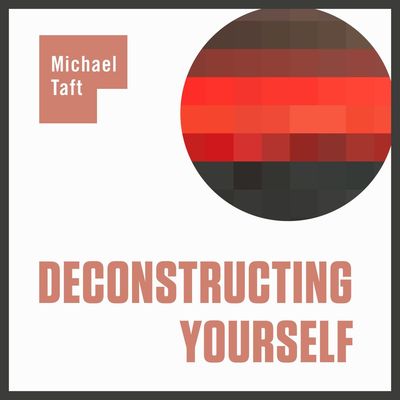Dedicated to liberation in all its forms, Deconstructing Yourself is passionate about fearlessly investigating, attempting, and questioning all things to do with awakening, meditation, mindfulness, brain hacking, consciousness, neurofeedback, and more.Your host Michael W. Taft interviews some of the most interesting thinkers, authors, and teachers around, as well as other offerings. In this hard-hitting, radical, and fun podcast we look at secular post-, non-, un- Buddhism, Vajrayana, nondual Hindu Tantra, philosophy, the neuroscience of the sense of self, neurofeedback and the consciousness hacking movement, aspects of artificial intelligence, entheogens, and much more.If you’re looking for fresh directions, free from dogma and conformism, think of the Deconstructing Yourself podcast as the radical cafe where you can hear from the most interesting luminaries either from the outside edges of dharma, or a fresh take from more traditional teachers. If you’re interested in more, check out the Deconstructing Yourself website at https://deconstructingyourself.com.
https://deconstructingyourself.com
episode 31: Deconstructing the Heart Sutra, with Jayarava Attwood
Buddhist scholar Jayarava Attwood speaks with host Michael Taft about the history of the Pali Canon, how ideas about karma & dependent arising contradict each other, the shifting grounds under the apparent solidity of the suttas, monism vs. pluralism, meditation as a subjective or objective practice, and the fact that the Sanskrit Heart Sutra is a forgery,
Jayarava is a longtime member of the Triratna Buddhist Order, who writes about the history of ideas in Buddhism. Since 2012 he has been mainly focused on revising the text and history of the Heart Sutra, and also writes about karma and how it changed over time. His blog explores the clash between modernity and tradition with respect to Buddhism. He also works in various art forms, including music, painting, photography, and calligraphy.
Links
- Jayarava. (2018) ‘Anupalambhayogena: An Underappreciated Mahāyāna Term’. http://jayarava.blogspot.com/2018/05/anupalambhayogena-underappreciated.html
- Huifeng. (2014). ‘Apocryphal Treatment for Conze’s Heart Problems: “Non-attainment”, “Apprehension”, and “Mental Hanging” in the Prajñāpāramitā.’ Journal of the Oxford Centre for Buddhist Studies. 6: 72-105. https://www.academia.edu/8275423/Apocryphal_Treatment_for_Conze_s_Heart_Problems_Non-attainment_Apprehension_and_Mental_Hanging_in_the_Praj%C3%B1%C4%81p%C4%81ramit%C4%81_Hrdaya
On the anupalambha meditation practice:
- Cūḷasuññata Sutta. Majjhima Nikāya 121. https://www.accesstoinsight.org/tipitaka/mn/mn.121.than.html
- Satyadhana. (2014) ‘The Shorter Discourse on Emptiness (Cūḷasuññatasutta, Majjhima-nikāya 121): translation and commentary.’ Western Buddhist Review 6: 78–104. https://thebuddhistcentre.com/system/files/groups/files/satyadhana-formless_spheres.pdf
- Anālayo. (2014). Compassion and Emptiness in Early Buddhism. https://www.windhorsepublications.com/product/compassion-and-emptiness-in-early-buddhist-meditation/
Show Notes
0:25 – Introduction
2:29 – How Jayarava got involved with the Triratna Buddhist Order and learned Pali
5:47 – The history of the Pali Canon; figuring out when the texts were first recorded; how accurately the original words were memorized
11:45 – Fitting together the concepts of karma and dependent origination; how different Abhidhamma groups and others tried to resolve the contradictions
17:07 – How rebirth became a burden to escape from, rather than a good thing; different concepts of afterlife
21:12 – Differences in source texts; how translations are influenced by commentaries
25:32 – History of the Heart Sutra
30:19 – Jan Nattier’s discovery that the Sanskrit HeartSutra is not original but a translation from Chinese, and how often this sort of thing might have occurred with other texts; Matthew Orsborn’s paper showing errors in previous interpretations of the Heart Sutra. “It’s not saying, ‘Okay, form doesn’t exist. It’s just an illusion.’ It’s saying when you get to a certain point in your meditation, form stops arising. It’s not that there’s no form; it’s just that, for you in that moment, form doesn’t exist, or it doesn’t arise.”
36:45 – Description of a meditation practice of paying attention to what’s absent; insight arising after cessation
42:12 – If you do this sort of critical analysis of Buddhism and parts of it fail, what’s left? The practices and ways of talking about them; the value of practice in modern life
46:11 – The problem of bundling mindfulness with religion, the usefulness of secular mindfulness; multiple ways of teaching are valuable; monism versus pluralism
54:01 – Discovering the nature of subjective reality, rather than seeing reality as it really is
59:16 – Outro
Please support the Deconstructing Yourself podcast on Patreon
See Privacy Policy at https://art19.com/privacy and California Privacy Notice at https://art19.com/privacy#do-not-sell-my-info.
